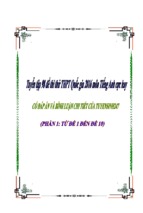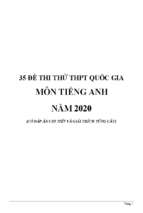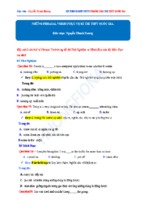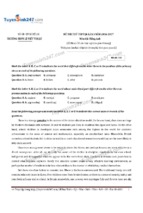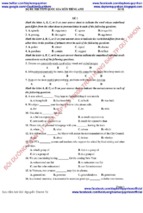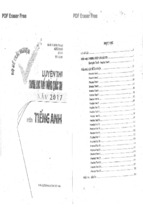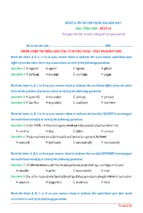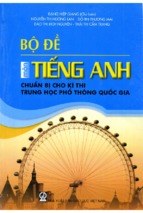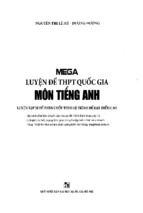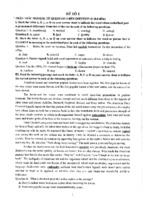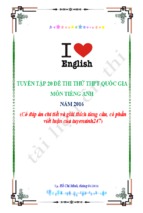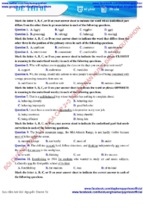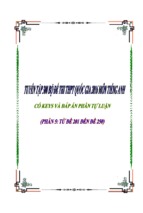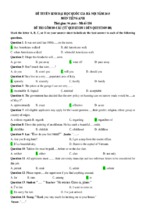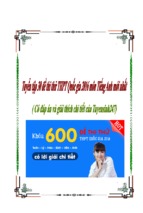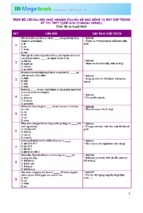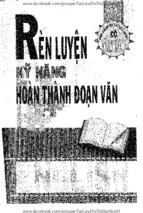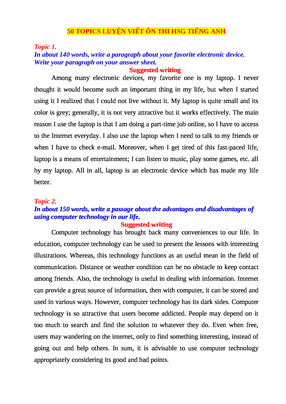ĐỀ THI THỬ ĐẠI HỌC SỐ 18
Môn: TIẾNG ANH; Khối D
Thời gian làm bài: 90 phút, không kể thời gian phát đề
ĐỀ THI GỒM 80 CÂU (TỪ QUESTION 1 ĐẾN QUESTION 80)
I. Mark the letter A, B, C, or D on your answer sheet to indicate the word whose main stress is
placed differently from that of the rest in each of the following questions.
Question 1
A. temperature
B. photograph
C. information
D. consequence
Trọng âm của từ "information" rơi vào âm tiết thứ ba. Còn trọng âm của các từ còn lại rơi vào
âm tiết đầu tiên.
(A: /'temprətʃə(r) /, B: /'fəʊtəɡrɑ:f/, C: /ˌɪnfə'meɪʃn /, D: /'kɒnsɪkwəns/)
Question 2
A. organism
B. investigate
C. diversity
D. technology
Trọng âm của từ "organism" rơi vào âm tiết đầu tiên. Còn trọng âm của các từ còn lại rơi vào âm
tiết thứ hai.
(A: /'ɔ:ɡənɪzəm/, B: /ɪn'vestɪɡeɪt/, C: /daɪ'vɜ:səti/, D: /tek'nɒlədʒi /)
Question 3
A. carnivore
B. difference
C. scientist
D. environment
Trọng âm của từ "environment" rơi vào âm tiết thứ hai. Còn trọng âm của các từ còn lại rơi vào
âm tiết đầu tiên.
(A: /'kɑ:nɪvɔ:(r)/, B: /'dɪfrəns/, C: /'saɪəntɪst/, D: /ɪn'vaɪrənmənt/)
Question 4
A. condition
B. habitat
C. accident
D. paragraph
Trọng âm của từ "condition" rơi vào âm tiết thứ hai. Trọng âm của các từ còn lại rơi vào âm tiết
đầu tiên.
(A: /kən'dɪʃn/, B: /'hæbɪtæt /, C: /'æksɪdənt/, D: /'pærəɡrɑ:f/)
Question 5
A. mysterious
B. medicine
C. discover
D. description
Trọng âm của từ "medicine" rơi vào âm tiết đầu tiên, còn trọng âm của các từ còn lại rơi vào âm
tiết thứ hai.
(A: /mɪ'stɪəriəs/, B: /'medɪsn/, C: /dɪ'skʌvə(r)/, D: /dɪ'skrɪp ʃn/)
II. Mark the letter A, B, C, or D on your answer sheet to indicate the correct answer to each of
the following questions.
Question 6: There’s a list of repairs as long as__________.
A. a mile
B. a pole
C.your arm
D. your arms
- Ta có cấu trúc "as long as your arm" có nghĩa là rất dài - very long
Question 7: The news was__________to them that they were all dead silent.
A. such shock
B. such a shock
C. so shock
D. too shock
- Ta có theo sau chỗ trống là danh từ "shock" do đó ta dùng cấu trúc "S + V + such + Noun/
Noun phrase + that + clause" =>Loại đáp án C và D.
- Mạo từ không xác định "a đứng trước danh từ ở đây mang nghĩa là mỗi/ một.
- "a shock" - một cú sốc.
=>Đáp án đúng là B.
Question 8: In the United States__________the states but Hawaii is an island.
A. none of
B. neither of
C. all of
D. no of
- Ta có "No/ None of + N (số nhiều)/ N (số ít)/ N (không đếm được) " có nghĩa là không có cái
nào.
- Trong câu này loại đáp án D vì không có "of" sau "No".
- Loại đáp án B vì cùng có nghĩa là không có cái nào nhưng "neither of" thường dùng cho 2 đối
tượng còn "none of" dùng cho nhiều đối tượng.
=>Đáp án đúng là A vì Mỹ có 50 bang.
Question 9: What a__________! I have left the umbrella at home and now it starts raining.
A. complaint
B. sorry
C. shame
D. regret
- Ta có cấu trúc "What a shame!" = "What a pity!" có nghĩa là "Tiếc quá!"
Question 10: ________ are forms of carbon has been known since the late 18th century.
A. Diamonds
B. Diamonds, which
C. Because diamonds
D. That diamonds
- Ta thấy trong câu này có 2 động từ đều được chia ở thì mà không có từ nối nối chúng với nhau.
Như vậy chỉ có một trong 2 là động từ chính của câu. Ta cần xác định rõ động từ và chủ ngữ
chính của câu.
- Trong câu này động từ chính của câu là "has been known" và cả vế phía trước là chủ ngữ của
câu.
- Trong câu này "that" đứng đầu câu bao hàm nghĩa cho cả chủ ngữ được dịch là "việc/ việc mà"
- Câu này được dịch là : Kim cương là một dạng của cacbon, điều này đã được biết đến từ cuối
thế kỷ 18.
Question 11: We would rather Helen________ us all the information we needed. We should
have been well informed.
A. sent
B. send
C. had sent
D. have sent
- "We should have been informed." - Đáng lẽ chúng ta phải được thông báo rõ ràng. -> Như vậy
việc Helen thông báo những thông tin cần thiết là không có thật trong quá khứ.
- Lại để ý thấy câu dùng cấu trúc với "would rather". Từ này được dùng trong nhiều cấu trúc với
những ý nghĩa khác nhau. Tuy nhiên chỉ có 2 cấu trúc mà sau 'would rather' là một mệnh đề.
Cấu trúc thứ nhất, động từ trong mệnh đề sau "would rather" chia ở quá khứ đơn có ý nghĩa như
một lời yêu cầu trang trọng, diễn tả ý ai đó muốn người khác làm gì ở thời điểm hiện tại.
Cấu trúc thứ 2, động từ trong mệnh đề sau "would rather" chia ở quá khứ hoàn thành có ý nghĩa
giống như một điều ước cho quá khứ.
- Căn cứ theo nghĩa của câu thì phải dùng cấu trúc thứ 2.
=>Đáp án trong câu này là C.
Câu này nghĩa là: Chúng tôi ước Helen gửi cho chúng tôi tất cả những thông tin mà chúng tôi
cần. Đáng lẽ chúng tôi phải được thông báo rõ ràng.
Question 12: Only because she had to support her family________to leave school.
A. that Alice decides
B. so Alice decided
C. Alice decided
D. did Alice decide
- Đầu câu là "Only because" (Only + trạng ngữ) nên ta phải tiến hành đảo ngữ ở vế sau.
=>Đáp án đúng là D.
Question 13: Sorry, my father is out. Can I ________a message?
A. leave
B. take
C. put
D. make
- Ta có cấu trúc "Can I take a message?" có nghĩa là : Tôi có thể ghi lại lời nhắn được không?
Question 14: ________ pollution control measures are expensive, many industries hesitate to
adopt them.
A. Because
B. Although
C. However
D. On account of
- Dựa vào nghĩa của câu (...các biện pháp kiểm soát ô nhiễm là đắt, nhiều nhà máy vẫn lưỡng lự
trong việc áp dụng chúng.) thì đáp án B và D bị loại.
- Cấu trúc với "because + clause" và cấu trúc với "on account of = due to = because of + N/
Noun Phrase"
=>Đáp án đúng là A.
Question 15: Income tax rates are usually________ to one’s annual income.
A. dependent
B. associated
C. adapted
D. related
- Ta có cấu trúc "dependent on" có nghĩa là phụ thuộc vào.
- Cấu trúc "associated" có nghĩa là kết hợp
- "adapted" có nghĩa là làm thích nghi, làm thích ứng
- "related to" có nghĩa là có liên quan, có quan hệ
=>Đáp án đúng là D. Câu này được hiểu là: Tỷ lệ thuế thu nhập thường liên quan đến thu nhập
hàng năm của một người.
Question 16: The majority of primary school teachers________ women.
A. is
B. are
C. includes
D. including
- Ta có cấu trúc "the majority of + N (đếm được số nhiều) + V(chia ở số nhiều) "
=>Đáp án đúng là B.
Question 17: ________today, there would be nowhere for them to stay.
A. Were they to arrive
B. If they arrive
C. Had they arrive
D. Provided they arrived
- Dựa vào vế sau của câu ta có thể đoán được đây là hình thức câu điều kiện loại 2.
=>A là đáp án đúng. Đây là hình thức đảo ngữ trong câu điều kiện loại 2.
Question 18: “I’m taking my driving test tomorrow.” “________!”
A. Luck
B. Best wishes
C. Good luck
D. Good chance
- Khi cần động viên một người sắp thực hiện một việc nào đó chúng ta dùng "Good luck! =
Break a leg!" có nghĩa là "Chúc may mắn!"
Question 19: The restaurant is very popular with film stars, artists, and the________ .
A. same
B. similar
C. such
D. like
-Ta có cấu trúc từ "the like" có nghĩa là những người thuộc loại như vậy/ những vật thuộc loại
như vậy.
=>Đáp án đúng là D. Câu này được dịch là: Nhà hàng đó rất được ưa chuộng bởi những ngôi
sao điện ảnh, các nghệ sỹ và những người đại loại như vậy.
Question 20: There are different styles in classical music,________on when the music was
composed.
A. depend
B. depending
C. depends
D. depended
- Đây là hai câu được kết hợp bởi đại từ quan hệ. Vì đây là hình thức câu chủ động nên khi bỏ
đại từ quan hệ đi chúng ta chuyển động từ sang dạng V-ing.
=>B là đáp án đúng.
Question 21: No longer________here.
A. John works
B. John does work
C. does John work
D. so John works
- Cấu trúc với "No longer" đứng đầu chúng ta dùng hình thức đảo ngữ =>C là đáp án đúng.
Question 22: His parents could not help________angry when he admitted________the exam.
A. getting/ failing
B. got/ failed
C. to get/ to fail
D. get/ to fail
- Ta có cấu trúc với "can't help + V-ing" có nghĩa là không thể không hoặc không thể nhịn được
việc gì.
- Cấu trúc "admit + V-ing" có nghĩa là nhận/ chấp nhận việc gì.
=>A là đáp án đúng.
Question 23: Hundreds of animals are reported________ killed in the forest fire yesterday.
A. that to be
B. to be
C. to have been
D. that to have been
- Đây là cấu trúc bị động đặc biệt: It is said that.../He is said to + V (Trong đó 'said" có thể
được thay bằng phân từ quá khứ của một số động từ tường thuật khác, chủ ngữ và thì của động
từ cũng được dùng sao cho thích hợp.)
- Vì động từ ở hai mệnh đề diễn ra ở hai thời điểm khác nhau ("are" ở vế trước là thì hiện tại, vế
sau là "yesterday" ở thì quá khứ) nên ta có cấu trúc bị động là : "S2 + to be (chia phù hợp với
thì của động từ tường thuật và chủ ngữ) + V(cột 3/-ed) + to have + V (cột 3/ V-ed)".
=>Đáp án đúng là C.
Question 24: Her idea about ________special class for________disabled at first met with
opposition from their parents.
A. a/a
B. a/ these
C. a/ the
D. the/0
- Ở chỗ trống đầu tiên ta cần điền mạo từ "a" mang nghĩa là "một" , "a special class" - một lớp
học đặc biệt.
- Chỗ trống thứ 2 cần điền mạo từ "the", khi "the + adj" dùng để chỉ một nhóm người (Ví dụ
như "the rich" là người giàu có). Ở đây "the disabled" có nghĩa là người khuyết tật/ người tàn
tật.
=>Đáp án đúng là C.
Question 25: Both televisions and computers________ an enormous impact on our lives.
A. have
B. had had
C. have has
D. have had
- Khi chủ ngữ có cấu trúc "both ... and ..." thì động từ chia ở dạng số nhiều.
- Chúng ta dùng thì hiện tại đơn trong câu này bởi vì nó là câu miêu tả sự việc ở hiện tại.
=>Đáp án đúng là A.
III. Mark the letter A, B, C, or D on your answer sheet to indicate the sentence that is closest
in meaning to each of the following questions.
Question 26: If only I had not seen him.
A. He wishes he had come to see me.
B. I have not seen him for ages.
C. I wish I had seen him.
D. I wish I had not seen him.
- Ta có cấu trúc "if only = wish" diễn tả câu điều ước không có thật ở quá khứ.
Question 27: She told me she had to be home by six o'clock.
A. She told me that she would be going home at six o'clock.
B. She told me she was at home at six o'clock.
C. She said it was necessary for her to get home before six o'clock.
D. She said that she usually reached her home before six o'clock.
- Dựa vào nghĩa của các lựa chọn ta thấy chỉ đáp án C mới diễn tả đủ ý của câu đề với "had to"
(phải/ bắt buộc) = "it was necessary" (cần thiết)
=>Đáp án đúng là C.
Question 28: They did not take my advice and they got the troubles.
A. Had they taken my advice, they would not have got the troubles.
B. Unless they had taken my advice, they would have got the troubles.
C. Had they taken my advice, they would not have got the troubles?
D. Unless they had taken my advice, they would not have got the troubles.
- Câu đề đưa một tình huống trong quá khứ : Họ không nghe theo lời khuyên của tôi và họ đã
gặp rắc rối.
- Lựa chọn A là đáp án đúng nhất. Ta viết lại bằng cấu trúc câu điều kiện loại 3- diễn tả một tình
huống không có thật ở quá khứ.Đặt "had" lên cầu câu là hình thức đảo ngữ.
- Lựa chọn C giống với lựa chọn A, tuy nhiên dùng không đúng dấu chấm câu.
Question 29: The family find it difficult to manage on the money they have.
A. The family managed to earn enough money.
B. It is difficult for the family to get by on the money they have.
C. The family could manage on the money they have.
D. It is difficult for them to earn money.
- Cấu trúc "find it difficult to do something" có nghĩa là nhận thấy thật khó khăn khi làm gì.
- Có thể viết lại bằng cấu trúc "It is difficult + for somebody + to V" có nghĩa là thật khó cho
ai khi làm gì.
=>B là đáp án đúng.
Question 30: I do apologize for my forgetting your birthday.
A. I am really sorry I forgot your birthday.
B. I did not forget your birthday.
C. I never apologize for my forgetting birthdays.
D. I am not sorry at all because I remember your birthday.
- Ta có cấu trúc "I do apologize = I am really sorry".
Dùng trợ động từ "do" mang tính chất nhấn mạnh và tương đương với trạng từ chỉ mức độ
"really".
=>Đáp án đúng là A.
IV. Mark the letter A, B, C, or D on your answer sheet to show the underlined part that needs
correction in each of the following questions.
Question 31: Because of (A) his mother has been (B) seriously ill (C), she can't come (D)to the
party.
A
B
C
D
- ta có cấu trúc với "because of + Noun/ Noun phrase"
=>Đáp án cần sửa là A. Sửa "because of" thành "because".
Question 32: It was not until (A) 1937 when (B) the southernmost source of the (C) Nile River
was discovered (D).
A
B
C
D
- Ta có cấu trúc "It was not until + thời gian + that + clause" dùng để nhấn mạnh khoảng thời
gian mà một sự việc nào đó diễn ra.
=>Đáp án cần sửa là B. Sửa "when" thành "that".
Question 33: The tongue is the principal (A) organ of taste (B), and is (C) crucial for chewing,
swallowed (D), and speaking.
A
B
C
D
- Từ 'and' có tác dụng nối các thành phần ngữ pháp tương đương nhau. Ở đây, "and" nối các
động từ dạng V-ing với nhau (vì trước đó là giới từ mà sau giới từ động từ luôn ở dạng V-ing)
=>Đáp án cần sửa là D. Sửa "swallowed" thành "swallowing".
Question 34: Because (A) of habitat loss (B), there are less (C) Asian elephants than African
elephants (D).
A
B
C
D
- Ta có hình thức so sánh ít hơn với danh từ sử dụng tính từ less và fewer.
- "less" đi với danh từ không đếm được và "fewer" đi với danh từ đếm được số nhiều.
=>Đáp án cần sửa trong câu này là đáp án C. Sửa "less" thành "fewer" vì danh từ "Asian
elephants" là danh từ số nhiều.
Question 35: He could remember to drive (A) along (B)the road just before (C) the accident
happened, but (D) he couldn't remember the accident itself.
A
B
C
D
- Ta có cấu trúc với "remember" gồm "remember + V-ing" - nhớ đã làm gì (một việc đã được
thực hiện) - và "remember + to V" có nghĩa là nhớ để làm gì (một việc sẽ làm trong tương lai).
=>Đáp án cần sửa là A. Sửa "to drive" thành "driving" vì đây là việc đã xảy ra rồi.
V. Read the following passage and mark the letter A, B, C, or D on your answer sheet to
indicate the correct word for each of the blanks from 36 to 45.
When you read something in a foreign language, you frequently come across words you do not
(36)_______ understand. Sometimes you (37)_______the meaning in a dictionary and
sometimes you guess. The strategy you adopt depends very much upon the (38)_______of
accuracy you require and the time at your disposal.
If you are the sort of person who tends to turn to the dictionary frequently, it is
(39)_______remembering that every dictionary has its limitations. Each definition is only an
approximation and one builds up an accurate picture of the meaning of a word only after meeting
it in a (40)_______of contexts. It is also important to recognize the special dangers of
dictionaries that translate from English into your native language and vice versa. If you must use
a dictionary, it is usually far safer to(41)_______an English-English dictionary.
In most exams you are not permitted to use a dictionary. (42)_______you are allowed to use
one, it is very time- consuming to look up words, and time in exams is usually limited. You are,
(43)_______, forced to guess the meaning of unfamiliar words.
When you come across unknown words in an exam text, it is very easy to panic. However, if
you develop efficient techniques for guessing the meaning, you will (44)_______a number of
possible problems and help yourself to far more of the text than you at first thought likely.
Two strategies which may help you guess the meaning of a word are: using contextual clues,
both within the sentence and outside, and making use of clues (45)_______from the formation of
the word.
Question 36:
A. wholly
B. fully
C. totally
D. completely
-wholly (adv) : toàn bộ, hoàn toàn
- fully (adv): đầy đủ, hoàn toàn
- totally (adv) : hoàn toàn
- completely (adv): hoàn toàn
Cả 4 trạng từ trên đều có nghĩa tương tự nhau. Tuy nhiên không phải tất cả chúng đều có thể kết
hợp được với "understand". Trong tiếng Anh có một khái niệm đó là "collocation". Theo khái
niệm này thì một từ chỉ đi được với một hoặc một số từ nhất định.
Trong các lựa chọn thì chỉ có "fully" là đi được cùng "understand". Ta dùng "fully understand"
có nghĩa là hiểu một cách đầy đủ, hiểu một cách thấu đáo vấn đề gì.
Question 37:
A. inspect
B. control
C. check
D. examine
- inspect (v) : có nghĩa là kiểm tra, thanh tra
- control (v) : điều khiển, chỉ huy, kiểm tra, kiểm soát
- check (v) : kiểm tra lại, tra lại
- examine (v) : khảo sát, nghiên cứu, kiểm tra
=>Trong câu này ngụ ý đang nói về việc bạn không hiểu rõ nghĩa của một từ và bạn kiểm tra lại
nghĩa của nó trong từ điển ta dùng động từ "check".
=>Đáp án đúng là C.
Question 38:
A. extent
B. level
C. degree
D. range
- Ta có cấu trúc "degree of accuracy " có nghĩa là độ chính xác.
Question 39:
A. worth
B. essential
C. valuable
D. vital
- Ta có cấu trúc "It is (not) worth + V-ing" có nghĩa là đáng để làm gì/ không đáng để làm gì.
- Các tính từ còn lại theo sau là "to V".
Question 40:
A. multiple
B. variation
C. variety
D. diversity
- Ta có cấu trúc "a variety of" có nghĩa là nhiều loại.
Question 41:
A. survey
B. consult
C. refer
D. inquire
- Khi nói đến việc tra cứu từ điển ta dùng động từ "consult"(tra cứu, tham khảo) .
- survey (v): khảo sát, điều tra
- refer (v): ám chỉ
- inquire (v): hỏi
Question 42:
A. In case
B. Provided
C. Although
D. Even if
- In case (conjunction): phòng khi, trong trường hợp
- Provided (that) (conjunction): miễn là, với điều kiện là
- Although (conjunction): mặc dù
- Even if (conjunction) : thậm chí, ngay cả khi
=>Đáp án đúng là D. Câu này có nghĩa là: Ngay cả khi bạn được phép sử dụng từ điển thì cũng
rất mất thời gian để tra từ.
Question 43:
A. therefore
B. so
C. however
D. so that
- Từ cần điền được ngăn cách với các thành phần còn lại của câu bằng dấu phẩy =>Loại đáp án
B và D (B và D đều là các liên từ, theo ngay sau chúng là mệnh đề và không có dấu phẩy ngăn
cách.)
- Dựa vào nghĩa của câu thì A. therefore (vì thế) là đáp án đúng.
Dịch nghĩa: Vì thế (vì việc tra từ rất tốn thời gian nếu được phép sử dụng tài liệu), bạn buộc
phải đoán nghĩa của những từ bạn không biết.
Question 44:
A. go over
B. overcome
C. get across
D. surpass
- go over (phrasal verb) : đi qua, vượt, ôn lại, tập dượt
- overcome (v) : khắc phục, đánh bại (khó khăn)
- get across (phrasal verb) : đi ngang qua, lướt qua (ai)
- surpass (v) : hơn, vượt trội
=>Đáp án đúng là B.
Question 45:
A. coming
B. extracted
C. derived
D. originated
- Ta có cấu trúc "derive from" có nghĩa là xuất phát từ/ bắt nguồn từ.
VI. Read the following passage and mark the letter A, B, C, or D on your answer sheet to
indicate the correct answer for each of the questions from 46 to 55.
Psychologist have debated a long time about whether a child’s upbringing can give it the
ability to do outstandingly well. Some think that it is impossible to develop genius and say that it
is simply something a person is born with. Others, however, argue that the potential for great
achievement can be develop. The truth lies somewhere between these two extremes.
It seems very obvious that being born with the right qualities from gifted parents will increase
a child’s ability to do well. However, this ability will be fully realized only with the right
upbringing and opportunities. As one psychologist says, “To have a fast car, you need both a
good engine and fuel.”
Scientists have recently assessed intelligence, achievement, and ability in 50 sets of identical
twins that were separated shortly birth and brought up by different parents. They found that
achievement was based on intelligence, and later influenced by the child’s environment.
One case involving very intelligent twins was quoted. One of the twins received a normal
upbringing, and performed well. The other twin, however, was brought up by extremely
supportive parents and given every possible opportunity to develop its abilities. That twin,
though starting out with the same degree of intelligence as the other, performed even better.
This case reflects the general principle of intelligence and ability. The more favorable the
environment, the more a child’s intelligence and ability are developed. However, there is no link
between intelligence and socioeconomic level of a child’s family. In other words, it does not
matter how poor or how rich a family is, as this does not affect the intelligence.
Gifted people can not be created by supportive parents, but they can be developed by them.
One professor of music said that outstanding musicians usually started two or three years earlier
than ordinary performers, often because their parents had recognized their ability. These
musicians then needed at least ten years’ hard work and training in order to reach the level they
were capable of attaining.
People who want to have very gifted children are given the following advice:
- Marry an intelligent person.
- Allow children to follow their own interests rather than the interests of the parents.
- Start a child’s education early but avoid pushing the child too hard.
- Encourage children to play; for example, playing with musical instrument is essential for a
child who wants to become an outstanding musician.
Question 46: When scientists studied intelligence and ability in twins, they found that_____.
A. different twins generally have different levels of ability
B. ability depends mainly on intelligence and achievement
C. intelligence and development are irrelevant to ability
D. ability depends both on intelligence and environment
- Dựa vào nội dung của 2 câu văn đầu của đoạn văn thứ 5 "This case reflects the general
principle of intelligence and ability. The more favorable the environment, the more a child’s
intelligence and ability are developed" =>Đáp án đúng là D.
Question 47: Scientists chose twins for their study because _____.
A. they have the same genetic background, usually with similar intelligence
B. they are born into the same family, hence the same upbringing
C. they have the same economic background and hence the same opportunities
D. each twin has the same environment as his/ her twin
- Dựa vào nội dung của câu văn sau "...That twin, though starting out with the same degree of
intelligence as the other... "
=>C là đáp án phù hợp nhất. Các nhà khoa học đã chọn những đứa trẻ sinh đôi để nghiên cứu vì
chúng có cùng nền tảng và có thể là chỉ số thông minh như nhau.
Question 48: How were great musicians different from ordinary musicians in their
development?
A. They practice playing their instruments for many years
B. They were exceptionally intelligent and artistic
C. They concentrated on music to the exclusion of other areas
D. Their ability was realized at an early stage and then nurtured
- Dựa vào nội dung của đoạn văn thứ 6 "Gifted people can not be created by supportive
parents ..... reach the level they were capable of attaining."
=>Đáp án đúng là D.
Question 49: The writer advises that gifted children should be allowed to follow _____.
A. only their interests in computer games
B. only their interests in musical instruments
C. their own interests
D. their parents’ interests
- Dựa vào nội dung của gạch đầu dòng thứ 3 từ dưới lên "Allow children to follow their own
interests rather than the interests of the parents."
=>Đáp án đúng là C
Question 50: When encouraging their gifted children, parents should avoid _____.
A. letting them play their own way
B. starting their education at an early age
C. pushing their children too hard
D. permitting them to follow their own interests
- Dựa vào nội dung của gạch đầu dòng thứ hai từ dưới lên "Start a child’s education early but
avoid pushing the child too hard."
=>Đáp án đúng là C.
Question 51: The remark: “To have a fast car, you need both a good engine and fuel.” in the
passage means that in order to become a genius, _____.
A. you need to have good health and good nourishment
B. you need intelligence and you need to develop it
C. you should try to move quickly and efficiently
D. you must nourish your brain and train your muscles hard
- Dựa vào lời nhận xét, chúng ta có thể rút ra, để trở thành một thiên tài thì bạn cần sự thông
minh và cần phải phát triển trí thông minh ấy.
Question 52: The word “others” used in the first paragraph refers to _____.
A. other people
B. other scientists
C. other geniuses
D. other children
- Đọc những câu văn trước từ "others", ta thấy "others" ở đây được dùng để thay thế cho danh từ
chỉ người "psychologist" phía trước.
=>Đáp án đúng là B.
Question 53: The word “favorable” in the passage mostly mean _____.
A.“of high quality or an acceptable standard”
B. “under the control or in the power of somebody else”
C. “good for someone and making him/ her likely to be successful”
D. “helping somebody to be more intelligent compared to the other people”
- "favorable" trong câu văn có nghĩa là thuận lợi, thuận tiện, có lợi ...
=> Đáp án đúng là C.
Question 54: All of the following statements are true EXCEPT_____.
A. a child’s intelligence is influenced by that of his/ her parents
B. studying different twins is useful scientific procedure
C. educational development depends completely on economic well-being
D. to become successful, a child need both native intelligence and developmente
- Dựa vào nội dung của đoạn thứ 5 "...However, there is no link between intelligence and
socioeconomic level of a child’s family. In other words, it does not matter how poor or how rich
a family is, as this does not affect the intelligence."
=>Đáp án đúng là C.
Question 55: The upbringing of highly intelligent children requires _____.
A. parental support and encouragement
B. an expensive education
C. wealthy and loving parents
D. good musical instruments
- Dựa vào nội dung của bài văn ta có thể thấy đáp án đúng trong câu này là A. Việc dạy dỗ được
những đứa trẻ thông minh cần sự ủng hộ và động viên của cha mẹ.
VII. Read the following passage and mark the letter A, B, C, or D on your answer sheet to
indicate the correct answer to each of the questions from 56 to 65.
Since the world became industrialized, the number of animal species that have either become
extinct or have neared extinction has increased. Bengal tigers, for instance, which once roamed
the jungles in vast numbers, now number only about 2,300. By the year 2025, it is estimated that
they will become extinct.
What is alarming about the case of the Bengal tiger is that this extinction will have been
caused almost entirely by poachers who, according to some sources, are not always interested in
material gain but in personal gratification. This is an example of the callousness that is
contributing to the problem of extinction. Animals such as the Bengal tiger, as well as other
endangered species, are valuable parts of the world’s ecosystem. International laws protecting
these animals must be enacted to ensure their survival – and the survival of our planet.
Countries around the world have begun to deal with the problem in various ways. Some
countries, in an effort to circumvent the problem, have allocated large amounts of land to
animals reserves. They then charge admission prices to help defray the costs of maintaining the
parks, and they often must also depend on world organizations for support. This money enables
them to invest in equipment and patrols to protect the animals. Another response to the increase
in animal extinction is an international boycott of products made from endangered species. This
has had some effect, but by itself it will not prevent animals from being hunted and killed.
Question 56: What is the main topic of the passage?
A. Endangered species
B. Problems with industrialization
C. The Bengal tiger
D. International boycotts
- Chủ đề chính của đoạn văn được thể hiện ngay ở đoạn mở đầu bài văn "...Since the world
became industrialized, the number of animal species that have either become extinct or have
neared extinction has increased..."
=>Chọn đáp án A.
Question 57: The word “poachers” could be best replaced by which of the following?
A. Concerned scientists
B. Enterprising researchers
C. Illegal hunters
D. Trained hunters
- Nghĩa của từ "poachers" được giải thích ngay ở vế sau "are not always interested in material
gain but in personal gratification"
=>C là đáp án đúng. "Poachers" chỉ những người săn trộm.
Question 58: The word “callousness” could be best replaced by which of the following?
A. incompetence
B. indirectness
C. insensitivity
D. independence
- Danh từ "callousness" có nghĩa là sự nhẫn tâm, sự tàn nhẫn gầnn nghĩa nhất với danh từ
"insensitivity".
Question 59: The previous passage is divided into two paragraphs in order to contrast:
A. A comparison and a contrast
B. A problem and a solution
C. A statement and an illustration
D. Specific and general information
- Dựa vào nội dung của hai đoạn văn chúng ta có thể thấy mối liên hệ giữa chúng là một đoạn thì
nêu ra vấn đề, tình trạng các loài động vật đang bị nguy hiểm như thế nào và đoạn sau thì đưa ra
các cách để giải quyết vấn đề.
=>Đáp án đúng là B.
Question 60: What does the word “this” refer to in the passage?
A. Bengal tiger
B. Interest in material gain
C. Killing animals for personal satisfaction
D. The decrease in the Bengal tiger population
- Dựa vào nghĩa của câu văn phía trước "this" => "This" dùng để ngụ ý nói đến việc giết hại
động vật để thỏa mãn nhu cầu cá nhân.
=>Đáp án đúng là C. Ở đây dùng từ đồng nghĩa "satisfaction = gratification".
Question 61: Where in the passage does the author discuss a cause of extinction?
A. Lines 3-4
B. Lines 5-6
C. Lines 6-7
D. Lines 1-2
Question 62: The word “defray” is closest in meaning to which of the following?
A. make a payment on
B. raise
C. low
D. make an investment toward
- Động từ "defray" có nghĩa là thanh toán, trả tiền = make a payment on.
Question 63: Which of the following could best replace the word “allocated”?
A. set aside
B. combined
C. taken
D. organized
- Động từ "allocate" có nghĩa là cấp cho (ai cái gì), phân phát, để dành ra = set aside.
Question 64: What does the term “international boycott” refer to?
A. A global increase in animal survival
B. A refusal to buy animal products worldwide
C. Defraying the cost of maintaining national parks
D. Buying and selling of animal products overseas
- Dựa vào nghĩa của câu văn "Another response to the increase in animal extinction is an
international boycott of products made from endangered species...." ta có thể đoán nghĩa của
"international boycott" có nghĩa là từ chối mua các sản phẩm động vật trên toàn thế giới. Danh
từ "boycott" có nghĩa là tẩy chay.
Question 65: Which of the following best describes the author’s attitude?
A. indifferent
B. forgiving
C. concerned
D. surprised
- Qua nội dung của đoạn văn ta thấy tác giả có thể hiện thái độ quan tâm lo lắng đến thế giới
động vật và nguy cơ tuyệt chủng của các loài động vât.
=>Đáp án đúng là C.
VIII. Mark the letter A, B, C or D on your answer sheet to indicate the sentence that expresses
the best meaning formed by the given words
Question 66: They/ leave/ early/ not catch/ traffic.
A. They left early so that not to catch in the traffic.
B. They left early to avoid being caught in the traffic.
C. They left early so as to not get caught in the traffic.
D. They left early in order to not get caught in the traffic.
- Lựa chọn A: chưa đúng cấu trúc vì sau "so that" là một mệnh đề.
- Lựa chọn B : Hợp lý. Cấu trúc chủ động "avoid + V-ing" và bị động là "avoid + being + PP".
- Lựa chọn C: Chưa đúng cấu trúc "in order + not + to V" chứ không phải là "in order to + not
+V".
Question 67: It/ not easy/ remain/ tranquil/ events/ suddenly/ change/ life.
A. It is not easy remain tranquil when events suddenly change life.
B. It is not easy to remain tranquil when events suddenly change your life.
C. It is not easy remaining tranquil when events suddenly change your life.
D. It is not easy to remain tranquil if events suddenly change life.
- Lựa chọn A: Chưa đúng cấu trúc vì "It is + adj + to V".
- Lựa chọn B: Đúng cấu trúc và hợp nghĩa
- Lựa chọn C : Chưa đúng cấu trúc vì "It is + adj + to V".
- Lựa chọn D: Chưa phù hợp về nghĩa.
Question 68: You/ should/ doctor/ see/ that cut.
A. You should have a doctor seen to that cut.
B. You should get a doctor seen to that cut.
C. You should have a doctor see to that cut.
D. You should ask a doctor see to that cut.
- Ta có cấu trúc "to have someone do something" có nghĩa là nhờ/ yêu cầu ai làm gì.
=>Đáp án đúng là C.
Question 69: She/ urge/ her husband/ accept/ post.
A. She urged that her husband accept the post.
B. She urged her husband accept the post.
- Xem thêm -


